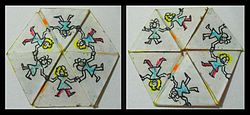Flexagon
In geometry, a flexagon is a flat model, usually made by folding a piece of paper, so that when 'flexed' (folded), one or more hidden faces will be revealed (shown) from within the model.
Flexagons are usually square or rectangular (tetraflexagons) or hexagonal (hexaflexagons). A prefix can be added to the name to show the number of faces that the model can display, including the two faces (back and front) that are visible before flexing. For example, a hexaflexagon with a total of six faces is called a hexahexaflexagon.
History
Discovery and introduction
Arthur H. Stone, a British man, is said to have first discovered the flexagon in 1939. At the time, he was a student at Princeton University in the United States. His new American paper would not fit in his English binder so he cut off the ends of the paper and began folding them into different shapes.[1] One of these formed a trihexaflexagon.
Other students became interested in these shapes. They included Bryant Tuckerman, Richard Feynman, and John Tukey. Together, they formed the Princeton Flexagon Committee. Tuckerman worked out a topological method, called the "Tuckerman traverse", for revealing all the faces of a flexagon.[2]
Flexagons were introduced to the general public by the recreational mathematician Martin Gardner in 1956. He wrote about in the first Mathematical Games column that he wrote for Scientific American magazine.[1]
Attempted commercial development
In 1955, Russell Rogers and Leonard D'Andrea of Homestead Park, Pennsylvania applied for a patent. In 1959 they were granted U.S. Patent number 2,883,195 for the hexahexaflexagon, under the title "Changeable Amusement Devices and the Like."
Their patent imagined possible ways that the device could be used as a toy, an device for advertising, or as a device for learning about geometry."[3] A few such novelties were produced by the Herbick & Held Printing Company in Pittsburgh. The device, marketed as the "Hexmo", were not very successful.
Flexagon Media
References
- ↑ 1.0 1.1 Gardner, Martin (December 1956). "Flexagons". Scientific American 195 (6): 162–168. . . https://archive.org/details/sim_scientific-american_1956-12_195_6/page/162.
- ↑ Gardner, Martin (1988). Hexaflexagons and Other Mathematical Diversions: The First Scientific American Book of Puzzles and Games. University of Chicago Press. ISBN 0-226-28254-6.
- ↑ Rogers, Russell E.; Andrea, Leonard D. L. (April 21, 1959). "Changeable amusement devices and the like" (PDF). Freepatentsonline.com. U.S. Patent 2883195. Retrieved January 13, 2011.



